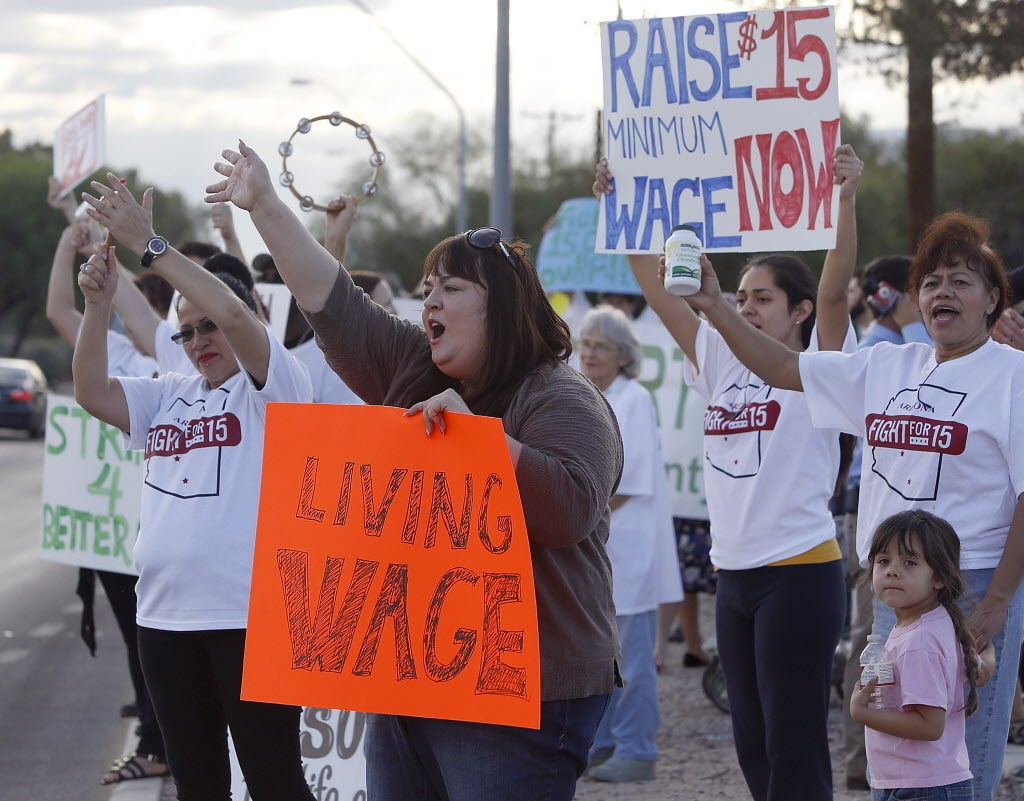PHOENIX — More than 700,000 Arizonans will get a wage hike beginning Sunday.
Without comment the state Supreme Court on Thursday morning rejected a last-ditch bid by the business community to delay the effect of Proposition 206. That measure, approved earlier this year by voters 58-42 percent, raises the current minimum wage of $8.05 an hour to $10 at the beginning of 2017.
The same initiative eventually increases that to $12 an hour by 2020. And beginning July 1 it requires employers to provide workers with at least three days of paid sick leave each year.
Today's ruling does not end the matter.
The justices have agreed to consider claims by initiative foes that the measure violates a constitutional provision which requires all ballot proposals that result in new state spending to have a dedicated revenue source.
There is no direct effect on the state payroll as state employees are not covered by the measure. But opponents, led by the Arizona Chamber of Commerce and Industry, contend that the measure will force the state's Medicaid program to increase what it pays private firms that provide nursing home and in-home care.
That's based on claims by some of the providers, whose contracts were negotiated under the assumption they could pay workers as little as $8.05 an hour, will go out of business if forced to pay more. And that, they said, would put the state in violation of its agreements with the federal government to maintain an adequate provider network.
Instead, the justices apparently accepted the arguments by initiative supporters that there is no reason to block hundreds of thousands of Arizonans now making less than $10 an hour from getting the pay hike voters said they should get.
And it probably did not help the arguments by foes that AHCCCS itself insisted that it is under no legal obligation to pay the providers more.
While the legal arguments were based on the effect of Prop. 206 on the state, the chamber's larger concern is the effect on businesses that will feel an immediate impact on their payroll costs.
"This one stinks,'' said chamber President Glenn Hamer.
But Hamer conceded business organizations may have no one but themselves to blame. It invested hundreds of thousands of dollars into the successful effort to block legalization of recreational marijuana in Arizona — and only about $50,000 trying to convince voters that a hike in the minimum wage is bad for the economy.
"We have to do a better job of making the case to the public,'' Hamer said. "I'll certainly submit that's a valid criticism.''
Today's ruling came not only over the objections of business interests but also Gov. Doug Ducey whose Office of Strategic Planning and Budgeting late Wednesday urged the justices to delay implementation of the higher wage requirement. That agency figures the additional cost to the state for the coming budget year will be $21.2 million.
While refusing to set aside the initiative for the time being, today's ruling still gives foes a chance to argue their claim in February that Prop. 206 does force the state to spend more money.
Attorneys for the business interests contend the Arizona Constitution spells out that can happen only if there is also a dedicated revenue source, like a new tax. Prop. 206 has no such levy.
But Hamer conceded the odds are not necessarily in his favor.
Arizona court rules provide a multi-part test for judges to consider when deciding whether to enjoin a new law from taking effect. And one of those factors is whether the challengers are likely to prevail after a full-blown court hearing.
But Maricopa County Superior Court Judge Daniel Kiley, who last week turned down the request for an injunction, said the chamber and its allies had not met that burden. And the Supreme Court, with today's order, essentially ratified his conclusion.
And there's something else working against the opponents.
In arguing for an injunction, attorney Brett Johnson said all he was seeking was to maintain the status quo until the legal arguments could be heard. That meant keeping the minimum wage where it is now.
By February, however, the status quo will have changed: An estimated 770,000 Arizonans now earning less than $10 an hour will be getting that much in their paychecks.
"This is a tough one,'' Hamer said.
"It doesn't change our legal arguments,'' he continued. "But it does change the dynamics on the ground.''





